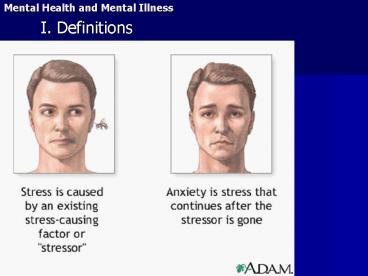Mental Health and Mental Illness - PowerPoint PPT Presentation
1 / 9
Title:
Mental Health and Mental Illness
Description:
Anxiety Neurosis free-floating anxiety in which the patient feels fearful and panicky ... C. Precipitating Stress. D. Irresponsible Behavior, Sins, or Ignorance ... – PowerPoint PPT presentation
Number of Views:719
Avg rating:3.0/5.0
Title: Mental Health and Mental Illness
1
Mental Health and Mental Illness
- I. Definitions
Mental Health
- in contact with reality
- free of overriding anxiety
Mental Health Problem
- lost contact with reality
- filled with anxiety
2
Mental Health and Mental Illness
- II. Defense Mechanisms
A. Projection attributes to someone else his
own thoughts and feelings
B. Reaction Formation does exactly the opposite
of what he would like to do
C. Rationalization way to avoid responsibility
or sin
D. Introjection assumes responsibility for
events outside their realistic control
E. Repression involuntary exclusion of unwanted
thoughts from consciousness
F. Suppression voluntary exclusion of unwanted
thoughts from consciousness
G. Compensation excelling in one area because
of inferior feelings in another
H. Idealization and Identification
overestimation of desirable traits in another
I. Isolation splitting off of an emotion from
an event or thought
J. Displacement shifts the emotional component
of one event to another event or person
3
Mental Health and Mental Illness
- III. Diagnosing Mental Problems
- Mental Retardation
- Type I.Q.
Borderline mental retardation 68-85
Mild mental retardation 52-67
Moderate mental retardation 36-51
Severe mental retardation 20-35
Profound mental retardation under 20
Causes infection, intoxication, trauma, physical
agent, disorder of metabolism, disorder of
nutrition, brain disease, chromosomal
abnormality, prematurity, psychosocial
deprivation, etc.
4
Mental Health and Mental Illness
- III. Diagnosing Mental Problems
B. Organic Brain Syndrome
Symptoms impaired intellect, impaired memory,
flat affect, impaired judgment, and impaired
orientation as to person, place, time
Causes alcohol, drugs, syphilis, encephalitis,
presenile dementia, senile dementia, brain
trauma, cerebral arteriosclerosis,
cerebrovascular disturbance, epilepsy, metabolic
disorder, and poison
Diagnosis patient will have trouble repeating a
few digits in reverse order after the counselor
or remembering four objects for a few minutes
5
Mental Health and Mental Illness
- III. Diagnosing Mental Problems
C. Psychosis
A loss of contact with reality
Three Divisions
Flat affect
Loose associations
Autistic
- Schizophrenia
Ambivalent
- Major Affective Disorders primarily mood
disorders
Involutional Melancholia severe depression
(possibly to delusional proportions) beginning in
middle age.
Manic-Depressive Psychosis either manic
(extremely euphoric, hyperactive, etc.),
depressed, or cycling between the two.
6
Mental Health and Mental Illness
- III. Diagnosing Mental Problems
C. Psychosis
A loss of contact with reality
Three Divisions
- Paranoid States lost contact with reality
through paranoid delusions
Paranoia elaborate delusional system in which
the patient thinks that others are out to harm
him/her.
Neurosis functional incapacity caused by anxiety
Obsessive-Compulsive Neurosis anxiety handled
by diverting it to obsessive thoughts or
compulsive actions (ego-alien)
Anxiety Neurosis free-floating anxiety in which
the patient feels fearful and panicky
Depressive Neurosis characterized by blueness,
sadness, helplessness, hopelessness,
worthlessness looks sad, feels sad, and has
trouble functioning socially and biologically.
Manic-Depressive Psychosis either manic
(extremely euphoric, hyperactive, etc.)
depressed, or cycling between the two
Phobic Neurosis anxiety is diverted to an
animal or object (irrational fear)
7
Mental Health and Mental Illness
- IV. Occurrence of These Disorders in Marriage
A. Obsessive-Compulsive Man Hysterical Woman
B. Passive-Aggressive Man Passive-Aggressive
Woman
C. Passive Man Dominant Woman
Parent-child type
D. Paranoid Man Depressive Woman
Sadomasochistic type
E. Paranoid Wife Depressive Husband
F. Asthenic Wife Obsessive-Compulsive Man
G. Obsessive-Compulsive Man Obsessive-Compulsive
Woman
8
Mental Health and Mental Illness
V. Psychophysiologic Disorders
A. Anxiety is handled by displacing it onto a
body function of the autonomic nervous system.
Thus, a system under control of the autonomic
nervous system is involved so that the patient
would experience a gastrointestinal disorder
(ulcers, gastritis, constipation), a respiratory
disorder (asthma, hyperventilation or hiccoughs),
a skin disorder (pruritus, dermatitis), or a
musculoskeletal disorder (backaches, headaches).
There is actual organ pathology but the cause is
emotional.
9
VI. Factors Causing Psychological Problems
Mental Health and Mental Illness
VI. Factors Causing Psychological Problems
A. Genetic Background
B. Environmental Background
C. Precipitating Stress
D. Irresponsible Behavior, Sins, or Ignorance































